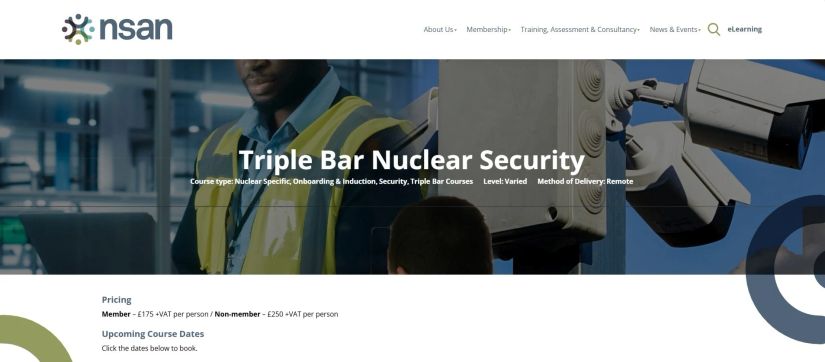The Triple Bar Nuclear Security (TBNS) is a ‘three bar’ training course delivered online via live online delivery. The Triple Bar Nuclear Security (TBNS) course is designed to provide a fundamental level of nuclear security knowledge to a broad, global audience.
The course is aimed at organisations, or individuals who are new to working in the civil nuclear industry in the United Kingdom, and/or those who wish to improve their knowledge of fundamental security standards which they will be expected to understand and follow. The TBNS is designed to be of use to persons in any job role, providing them with a distinct advantage in a highly regulated environment.
The aim of the course is to increase knowledge and understanding about the fundamentals of nuclear security in the UK focussing on core concepts including:

The TBNS course comprises of three ‘bars’:
Bar One: Civil Nuclear Industry Basic Security Directives
Explores the relationship between international agreements and relevant UK legislation; how security regulations are enforced and reviewed, as well as identifying security assessment principles which provide guidance to key stakeholders including regulatory bodies. The module introduces the requirements of a site security plan and highlights vulnerable assets and potential threat profiles.
Learning Outcomes – by the end of this bar delegates will be able to:
Bar Two: Civil Nuclear Industry Basic Security Essentials
Provides information and guidance on pre-employment and pre-site visit security awareness. The module informs on security vetting processes and procedures and the levels of security clearances. On-site awareness is explored and linked to site specific rules and the need to understand and engage in a positive security culture. Physical security design and application are identified and the roles and responsibilities of professional security providers such as the Civil Nuclear Constabulary and a Civilian Guard force.
Learning Outcomes – by the end of this bar delegates will be able to:
Bar Three: Civil Nuclear Industry Basic Security Accountability
Explains the definition of personnel security and the relationship between the vetting process and personnel security. The topics of information security, classification system, Office for Nuclear Regulation policy, and categories of sensitive information are addressed. The module explores the creation, handling, storage, and transmission of sensitive nuclear information, as well as protecting information when working outside a nuclear licenced site and discusses personal responsibilities when dealing with such information. Cyber security principles are addressed including personal responsibilities, industry measures, good practice, and general awareness.
Learning Outcomes – by the end of this bar delegates will be able to:
Delivery is via a live online tutor-led training session. To look for planned dates and book click here
Class size: up to 16 delegates

The Security Awareness training includes:
We offer a wide range of safety and security related training courses in person and online via E-Learning

We use cookies to enable essential functionality on our website, and analyze website traffic. By clicking Accept you consent to our use of cookies. Read about how we use cookies.